Site Search
- resource provided by the Forum Network Knowledgebase.
Search Tip: Search with " " to find exact matches.
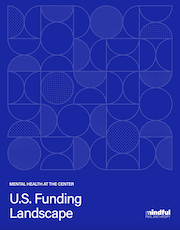
This comprehensive report provides an in-depth view of philanthropic giving toward mental health, addiction, and well-being in the United States.
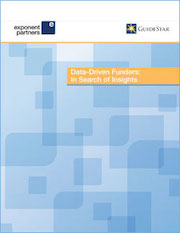
In this report, the Colorado Trust and Innovation Network chronicle the Trust's strategy for funding advocacy and provide a strategic evaluation for their successes and failures.
Learn how to support a disability-inclusive COVID-19 response.
COVID-19 disproportionately threatens the physical, financial, and emotional health of people with disabilities. Individuals with pre-existing health issues are at greater risk of contracting the coronavirus, many in the disability community still lack access to healthcare, and -- according to the National Trends in Disability report from the Kessler Foundation and University of New Hampshire’s Institute on Disability -- nearly one million working-age people with disabilities lost their jobs.
In this webinar, we’ll hear from Elaine E. Katz, MS, CCC/SLP, Senior Vice President Grants and Communication at the Kessler Foundation and Audrey Winkler, Executive Director of JESPY House.
Speakers will explore:
· Unique challenges facing people with disabilities during COVID-19.
· How philanthropy can support workforce opportunities for people with disabilities.
· Efforts to address ableism and create more inclusive policies and practices, on a national and local level.
For a truly equitable recovery that centers the experience of people facing multiple forms of systemic discrimination, we must address the ableism embedded in our systems, institutions, and culture. Join us for this important conversation on how your organization can address ableism in your fight for social justice, and support a more disability-inclusive response to COVID-19.
Cost: Free for CNJG Grantmakers. $50 for Non Member Grantmakers
Webinar Video
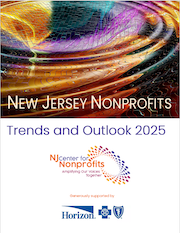
A key objective of the Scaling What Works initiative has been to translate insight and learning from grantmaker intermediaries involved with the Social Innovation Fund and share them with the broader philanthropic community. The fifth guide in the Lessons Learned series presents the benefits and challenges of partnerships between local and national funders, and highlights key considerations for both kinds of funders to foster success in their collaboration.
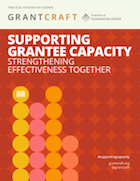
In Supporting Grantee Capacity: Strengthening Effectiveness Together, GrantCraft looks at how funders approach building capacity with grantees. Through examples from foundations ranging in size, mission, and geography, we explore various strategies for capacity building and the types of awareness that funders can choose to incorporate in decision making to facilitate informed, thoughtful judgments about strengthening organizations.
With the recent passage of the federal budget bill that slashed Medicaid and food assistance for millions of Americans while directing $170 billion to border militarization and the surveillance, detention, and deportation of immigrants, it is clear that private industry stands to profit while tearing families and communities apart. Indeed, between Trump’s election in November 2024 and April of this year, the stock prices of the nation’s two largest private detention facility operators, GEO Group and CoreCivic, soared 94% and 62% respectively – a pattern that the Brennan Center for Justice notes followed Trump’s first election. Indeed, in the immediate aftermath of the budget bill’s signing, both companies saw a further 3% increase in stock value.
With billions in philanthropic assets invested in financial markets, advocates have long called for divestment from private detention facilities and the broader prison-industrial complex. These efforts exist as part of the larger movement for divestment from the range of extractive industries that harm the very communities that foundations seek to support through their grantmaking. Numerous funders have taken up the challenge of revisiting their investment strategies to better align with their missions, with some also pursuing restorative grantmaking practices. In this session we’ll engage in a discussion with several of those funders, as well as an impact investment firm committed to advancing a regenerative economy.
This session will be an excellent opportunity for staff on both the investment and grantmaking sides of the house to learn first-hand what it looks like to operationalize divestment and impact investing strategies, so invite your colleagues and bring your questions!
Speakers
Hans How, Integrated Capital Officer, Restorative Economies Fund, Kataly Foundation
Alex Saingchin, Co-Founder & President, Just Futures
Rochelle Witharana, Chief Financial and Investment Officer, California Wellness
Moderator
Rachel Fagiano, Funders for Justice
Cost: Free
Foundation leaders have a unique opportunity to serve as powerful champions of their missions. Partnering with your grantees can amplify your impact. The following guide is designed to help you start having an honest conversation in the boardroom; a conversation about your foundation’s goals, approach, and, most importantly, vision for the future.
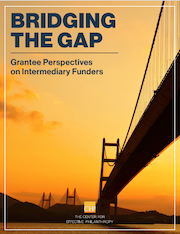
The Report represents the largest study of grantee experiences with intermediary funders to date and raises important considerations for intermediaries and originating funders alike. It shares insights into how grantees experience intermediary funders as compared to originating funders.
